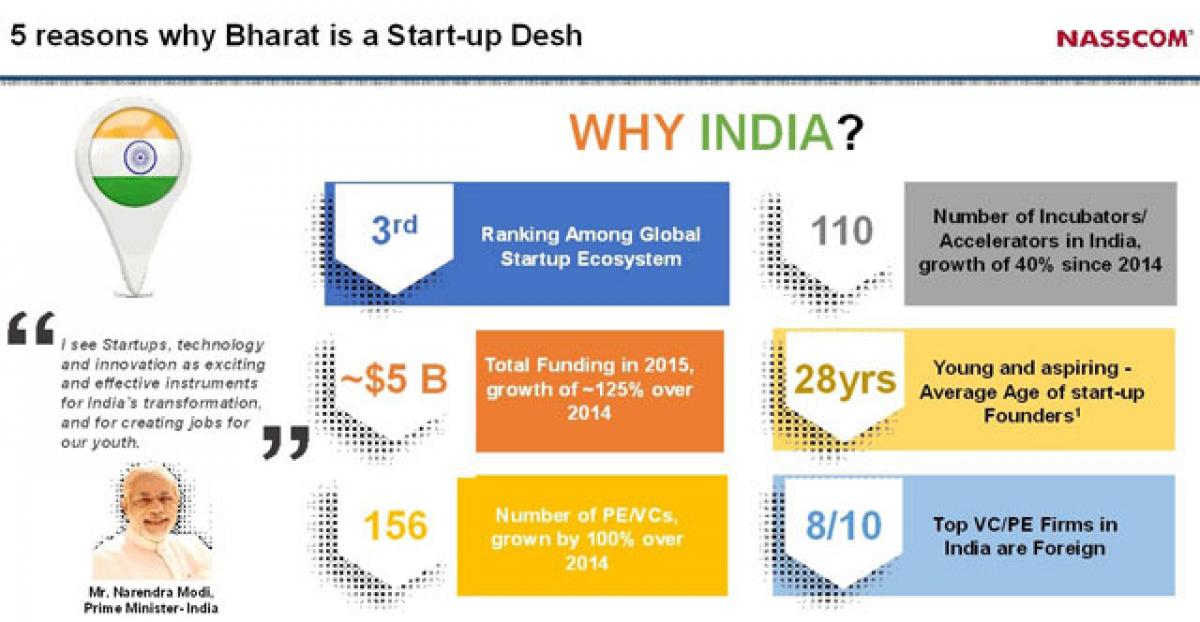Live
- ‘One nation, one election’ will undermine India’s federal structure: Mehbooba Mufti
- ‘Bachhala Malli’ trailer heightens anticipation
- Karnataka quota row: Backward Class forum chief warns Lingayat seer over 'tinkering with reservations'
- Tight security arrangements at Group-II examination centers District SP
- Alia Bhatt captures attention in white
- Varun Dhawan talks about ‘Baby John’
- ‘Moonwalk’ trailer promises a quirky heist, love, and loyalty
- Combat leaf spot disease
- Ahsaas Channaopens up about her complex character in ‘Mismatched 3’
- Radhika Apte welcomes first child, shares heartfelt post
Just In

The Narendra Modi government has made a lot of promises for entrepreneurs in India. How many of them have really helped the startup sector is a question that begs an answer.
The Narendra Modi government has made a lot of promises for entrepreneurs in India. How many of them have really helped the startup sector is a question that begs an answer. Irrespective of the answer, a general consensus is that it is the first government that has paid more than a nodding acknowledgment to entrepreneurship.
After he took over as the Prime Minister, Modi announced a slew of programmes to promote entrepreneurship in the country. Among them were ‘Skill India’ so that the large number of youth in the country could be skilled and become a productive youth force, ‘Make in India’ to promote manufacturing in the country, ‘Digital India’ to make the country a digitally connected and, indeed, the Startup India, Stand Up India programme.
Earlier, in the NDA government’s interim budget in 2014, Finance Minister Arun Jaitley announced the creation of Rs 10,000 crore dedicated startup fund, which promised a lifeline to cash-starved small firms. The Modi government has given a lot of impetus to entrepreneurship through these schemes, says Paula Mariwala, Partner, Seedfund and Co-Founder, Stanford Angels.
Sunil Goyal, CEO and Founder, YourNestIndia, says the biggest positive is that the government has put in place a policy that helps foreign capital to flow into the startups…Internationally, people are gung-ho about India and the government’s push to entrepreneurship. Indian startups have raised $3.5 billion in funding in the first half of 2015, and the number of active investors in India increased from 220 in 2014 to 390 in 2015, according to Economic Survey 2015-16.
All these aside, ironically, the sector continues to be troubled with issues thrown up mostly by the same programmes that were meant to make entrepreneur's life easier…The Stayzilla case, in which the company's CEO Yogendra Vasupal was arrested and put in jail in a payment default case about 2 months back, underscores the hardships of being an entrepreneur in India.
An open letter written by 345 prominent entrepreneurs to home minister Rajnath Singh says, “If ever there's a right to be an entrepreneur, that's clearly been violated. Period,” the letter says pointing out the way in which the case has been handled has already sullied India's image in the Silicon Valley. According to them, India now looks like the worst place to start up.
No govt orders
The ecosystem is largely teeming with youngsters who are fresh tech graduates and people who have had a few years in the corporate world before they decided to venture on their own ideas and startup a business. Many startups are bound to fail as that is the nature of the ecosystem with youngsters enthusiastically trying out new ideas.
But the government is loathe to give them orders, for instance in procurement. “Innovation as a rule is not understood by the government. Its officers prefer to take tenders from traditional businesses or products and services that have been used over a period of time,” says a startup entrepreneur, adding that it is because of ‘the fear of failure’ of something new and untried.
A startup which is into defence application and security finds no takers in the government as it is ‘innovative’ but has bagged orders in the US and also Israel among many countries.
Ease of doing business
The new Companies Act is draconian, says Mariwala. “To deal with various compliances for that it stipulates is very difficult for a startup. There has to be more ease of doing business which has not happened,” she says…The startup community needs government intervention...Though the Indian government has made a start with the announcement of various programmes for the startup community, it has not been able to provide a thriving ecosystem with ease of funding, tax breaks, laws that promote the sector like Singapore, for instance.
The government’s recently announced bankruptcy code is another source for worry. The new law enables banks to push for resolution/ recovery of the money from a troubled company within a period of 180 days, with a grace period of another 90 days if majority (75 per cent) of creditors agrees. If the recovery doesn’t happen, then the company will be liquidated automatically. “This will make it difficult for startup community,” says Harish HV, partner - India leadership team, Grant Thornton.
Startups should be able to close down when their ideas fail to take off. It is pertinent that the government explains on who the bankruptcy code can be applied to. World over, governments use pension funds to invest in private equity…The irony is domestic pension funds are not allowed to invest in domestic venture funds. This is one area the government must do a rethink about, say analysts.
By Sulekha Nair

© 2024 Hyderabad Media House Limited/The Hans India. All rights reserved. Powered by hocalwire.com







